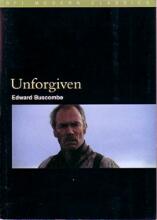Book Review: Edward Buscombe's Unforgiven - BFI Modern Classics
by j.d. lafrance
 There is little disputing that Clint Eastwood's Unforgiven (1992) is a landmark film in the western genre. Its gritty, realistic take won several Academy Awards and was lauded by critics and audiences alike. You would be hard pressed to think of another one that has been made since that is as good or has been as influential. Subsequent features like Kevin Costner's Open Range (2003) owe a significant debt to Eastwood's movie. Unforgiven by Edward Buscombe is one of the latest books in the British Film Institute's excellent Modern Classics series that offers an in-depth analysis and examines its place in the revisionist western genre.
There is little disputing that Clint Eastwood's Unforgiven (1992) is a landmark film in the western genre. Its gritty, realistic take won several Academy Awards and was lauded by critics and audiences alike. You would be hard pressed to think of another one that has been made since that is as good or has been as influential. Subsequent features like Kevin Costner's Open Range (2003) owe a significant debt to Eastwood's movie. Unforgiven by Edward Buscombe is one of the latest books in the British Film Institute's excellent Modern Classics series that offers an in-depth analysis and examines its place in the revisionist western genre.
Buscombe examines various aspects of Unforgiven, from its striking visuals (the movie is bookended by a poetic shot of lone man outlined against a sunset) to its gritty realism (Eastwood's character is a burnt out ex-gunfighter turned pig farmer who can't even mount his own horse without difficulty). Ultimately, he builds a convincing argument that Unforgiven may not be a revisionist western, as most critics have claimed. Buscombe points out that the film's violent ending seems to refute this notion because it reverts back to traditional genre conventions (i.e. the bad guys get theirs at the end).
The author starts by exploring the western genre from its decline in the '60s and '70s and the emergence of revisionist films like Robert Altman's Buffalo Bill and the Indians (1976) to its return to award-winning prestige with Kevin Costner's opus Dances with Wolves (1990). Buscombe makes some excellent observations along the way. For example, he points out that women are often marginalized in westerns but in Unforgiven it is their desire for justice that propels the action of the movie. He writes, the film "does not question their right to do what they do, only the motives and actions of those who perform on their behalf." Buscombe also notes that the more films Eastwood has made, the stronger and more interesting the female characters have become in contrast to the more flawed and vulnerable nature of his characters.
Buscombe goes through the entire movie and analyzes all of the major characters and their significance in the film and in the western genre. He shows an excellent knowledge of the western, referencing many films and how they relate to Unforgiven. Clocking in at a lean 95 pages, Buscombe's book can easily be read in one or two sittings. Fans of Eastwood's film will definitely want to read this book as it offers exceptional insights in a well-written manner that never resorts to obscure film lingo or goes off into impenetrable film theory.
Copyright (c) 2005 erasing clouds |
|